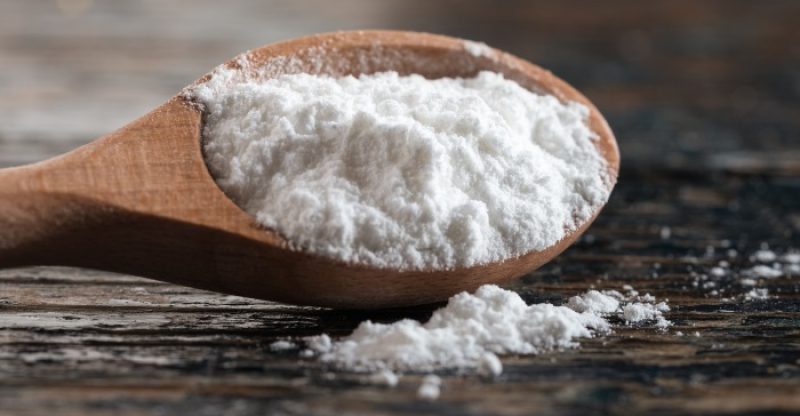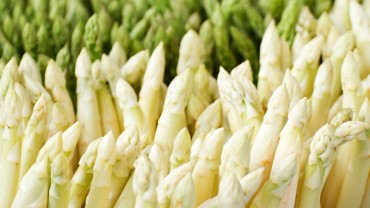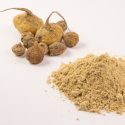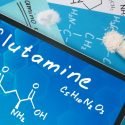Baking Soda: 8 Evidence-Based Benefits and 47 Uses
When it comes to the number and variety of uses, baking soda is the king of natural ingredients!
Its properties make it useful in so many situations and for some many purposes that you have to wonder why you’re not using it more.
As a cleaner and deodorizer, baking soda can be used in just about every room of your home, and the health and beauty uses are even more plentiful.
And it can treat many common ailments!
Our guide reveals all the common and not-so-common uses for this amazing natural product.
We’ll share some of our favorite natural remedies that utilize baking soda, and give you hints and tips for using this fantastic ingredient in a wide variety of ways.
Because baking soda is readily available and inexpensive, it makes the perfect addition to your home’s medicine cabinet, cleaning-supply kit, and beauty routine, and it’s safe enough to use every day.
Before we examine all the many uses for baking soda, let’s figure out what makes this natural ingredient so versatile and helpful.
Understanding Baking Soda
You probably have a box of baking soda in your house right now.
While baking soda is a familiar ingredient to most of us, you may also know it by its many other names, which include sodium bicarbonate, sodium hydrogen carbonate, bread or cooking soda, and bicarbonate of soda.
Baking soda is a molecular compound that’s made up of sodium, hydrogen, carbon, and oxygen.
Baking soda is alkaline, and it has a pH level of 9.
But what is pH, and why is it important?
All substances have a pH level, which is merely a measure of how alkaline or acidic it is.
Even human beings have a pH level.
Ions that are positively charged create a more acidic pH level, and ions that are negatively charged create an alkaline pH level.
Your body naturally wants to live at a balanced pH level.
While much of the baking soda used today is human-made, sodium bicarbonate does occur naturally, as well.
It’s known as a nahcolite, which is found in mineral form in many places around the globe.
Commercial mines for sodium bicarbonate exist in Kenya, Botswana, and the United States, and there are large deposits in other counties as well.
It’s important not to confuse baking soda with baking powder.
While baking soda is pure sodium bicarbonate, it contains both sodium bicarbonate and one or more acid salts.
While both baking powder and baking soda are used as leavening agents in baking, baking powder contains additional ingredients that make it inappropriate for all of the uses for baking soda we describe below.
Health Benefits of Baking Soda
Baking soda offers many fantastic health benefits for you and your family.
As a natural remedy and treatment, baking soda has been used all over the world for centuries.
It treats a number of common illnesses and injuries.
Your body actually manufactures its own bicarbonate in the kidneys, and it uses this compound to counterbalance the acidity that naturally occurs in your body.
If you’re not making enough bicarbonate on your own to lower your level of acidity, baking soda can even be used as a natural supplement for this essential nutrient.
Boosts Kidney Health
Because the kidneys are responsible for your natural bicarbonate levels, individuals with chronic kidney disease often have low blood-bicarbonate levels.
When patients with chronic kidney disease were given baking soda as a treatment, their disease progression significantly slowed down, and more patients stayed healthier longer.
Anyone who took baking soda as a supplement was also less likely to develop an end-stage renal disease, which is fatal.
Baking soda has been shown to slow disease progression, improve the overall prognosis, and improve the overall nutritional status of those with chronic kidney disease (1).
Baking Soda Soothes Digestive Problems
As a natural alkaline, baking soda is great for neutralizing acid within your body, and the #1 place where acid can easily wreak havoc is in your digestive system.
For treating heartburn and acid reflux, baking soda is a quick, easy, effective treatment (2).
If you’ve consumed too many acidic foods or drinks, slowing sipping on a mixture of baking soda and water can bring your pH levels back into alignment and neutralize some of the acids in your system.
Helps Your Skin
If you have itchy skin due to psoriasis, an allergic rash, insect bites, sunburn, or eczema, baking soda can naturally soothe and calm irritation.
The alkaline nature of baking soda promotes the lowering of inflammation, and a paste made from baking soda and water can draw out allergens and toxins that cause itching.
Helps with UTIs
Urinary tract infections (UTIs) are among the most common infections, especially among women.
For some women who experience chronic or prolonged symptoms from these infections, baking soda is an excellent treatment for lowering the acidic level of their urine (3).
While baking soda may not work in all women who suffer from UTIs, it can be an effective, inexpensive treatment for many.
Kills Microbes
Baking soda has antifungal and antibacterial properties that make it an excellent treatment for certain kinds of fungi and bacteria.
As a treatment for skin and nail infections, baking soda is effective at eliminating several types of yeasts, molds, and dermatophytes that cause infection (4).
In addition, baking soda is very effective at treating Streptococcus mutans, which is a bacteria that’s one of the leading causes of tooth decay (5).
Reduces Soreness and Fatigue
Strenuous exercise and athletic training produce acid in the body, especially the muscles.
Anyone who’s training regularly or looking to boost their performance can benefit from taking sodium bicarbonate before exercising.
This bicarbonate-loading activity serves to reduce acid levels within the body during exercise, which results in less muscle damage, reduced soreness, and more energy to sustain exercise (6).
Sodium bicarbonate seems to be most effective for short durations of strenuous exercise, as well as intermittent, sustained sessions that involve high-intensity training (7).
Many athletes who use bicarbonate-loading experience less muscle fatigue and improve their overall performance (8).
Helps during Chemotherapy
One of the unpleasant side effects of chemotherapy is that the chemicals used during treatment cause unwelcome changes to your mouth and throat.
Chemotherapy treatments destroy the good bacteria that are naturally present in your mouth and throat; this allows yeasts like candida albicans to flourish, which results in oral thrush (a type of yeast infection).
You can use baking soda to rinse the mouth and gargle, which helps control yeasts and other side effects from chemotherapy.
When your mouth and throat feel better, you’re more likely to eat and drink, which are necessary for optimal recovery from this harsh treatment.
Three times a day, rinse with a mixture of warm water, a 1/4 teaspoon of baking soda, and a 1/8 teaspoon of sea salt.
Then rinse with plain water.
Treats Kidney Stones
If you suffer from kidney stones, baking soda can help reduce your symptoms and decrease the formation of new stones (9).
Baking soda effectively removes the compounds that cause stones to form in your body.
There are many more important, interesting health benefits of baking soda.
We’ll cover them later, as we reveal all of the many uses for baking soda in your home.
Then we’ll even share a few of our favorite home remedies, which highlight the healthy powers of baking soda.
47 Ways to Use Baking Soda in Your Home
Beauty Uses of Baking Soda
Baking soda makes a great homemade toothpaste.
Baking soda rids your mouth of some of the bacteria that cause dental decay, and the abrasive nature of baking soda also effectively removes plaque (10).
Baking soda is a common ingredient in both traditional and natural kinds of toothpaste.
The best way to use baking soda is to either add it to your toothpaste or dip your toothbrush in baking soda and brush every few days.
Avoid doing both practices daily, as you could harm the enamel on your teeth.
Baking soda can also help whiten your teeth.
Once a week, use a paste of baking soda and water and rub it into your teeth.
Then allow it to sit for five minutes before rinsing your mouth.
The baking soda works to kill the bacteria in your mouth, which can dull and change the color of your teeth (11).
This teeth-whitening technique uses no harsh chemicals, and is very inexpensive, compared to traditional whitening products.
Use baking soda to soak your oral appliance.
Dentures, mouthpieces, and retainers can be soaked in a solution that consists of two teaspoons of baking soda dissolved in warm water.
It helps loosen particles, neutralize odors, and keeps your dental appliances fresh.
You can use baking soda to brush your appliances, the same way you use it to brush your teeth.
Baking soda makes an excellent natural deodorant.
After all, one of the baking soda’s greatest uses is its deodorizing capabilities, so why not use it on yourself?
To create a paste, mix one teaspoon of baking soda with water.
Then rub it under your arms.
Soothe your feet and fight foot infections with a baking-soda foot bath.
Add one tablespoon of baking soda to warm water, then soak your feet.
This practice will simultaneously kill bacteria, reduce foot odor, and reduce your risk for nail fungus.
Make your own clarifying shampoo by combining one teaspoon of baking soda with your regular shampoo, then washing and rinsing your hair as usual.
This clarifying technique easily and safely removes residue, oils, dirt, and other impurities from your hair.
Clean your brushes, combs, and other styling tools with baking soda.
With this easy-to-use technique, there are no harmful chemicals to damage your tools.
Coat them with a paste of water and baking soda, rub gently, and rinse thoroughly.
This process will remove unwanted grime, as well as the residual product.
You can use baking soda to exfoliate your face.
This dry-skin remover is simple and easy to use.
Combine a half-cup of water with one teaspoon of baking soda, then rub it into your skin in a circular motion.
Rinse with warm water.
This exfoliant is good for occasional use.
It removes dead skin, but be careful not to overuse it, as you can change the pH balance of your skin if you use it too frequently.
Baking soda also makes an excellent hand scrub.
If you have dirt or odors on your hands, you can scrub them away with a natural hand cleanser.
Make a paste with baking soda and water, then rub it into your hands.
After you rinse, feel how soft and smooth your hands feel.
If you have a rash, sunburn, bug bite, or other itchiness, baking soda helps calm irritated skin.
Create a paste using baking soda and warm water, then apply it to the affected areas.
Leave it in place for several minutes, and rinse with warm water.
For relief, repeat up to three times a day.
You can also use baking soda to get relief by applying a sunburn soak.
Mix 1/2 a cup of baking soda into a warm bath, and soak until the water becomes cool.
You can also mix your favorite lotion with baking soda to ease the sting of a sunburn.
Baking soda can help relieve diaper rash.
Dissolve two tablespoons of baking soda in bathwater.
This process helps soothe rashes, and it relieves the itching and redness associated with diaper rash.
Health Uses for Baking Soda
Baking soda can provide relief from indigestion and heartburn.
Many traditional medicines for heartburn already include sodium bicarbonate.
To make your own cost-effective heartburn treatment, add 1/2 a teaspoon of baking soda to two cups of cool water.
To get relief from acid and the heartburn it causes, drink the entire mixture.
Because baking soda neutralizes acid in your stomach, it can help treat a gastric ulcer.
By lowering the pH levels, your ulcer may experience less pain or irritation, which will reduce your symptoms.
To see if this option may be good for treating your type of ulcer, speak with your doctor.
Baking soda can help you get more from your workouts.
Soak in a warm bath that includes 1/2 a cup of baking soda after exercise, which will help your body neutralize the lactic acid that builds up in muscles when they’re exerted.
As discussed earlier, the oral supplementation of baking soda may also enhance performance.
This multifunctional product can also improve your kidney function.
When your kidneys aren’t functioning well, they have a hard time keeping your pH balance in check.
Supplementing with oral sodium bicarbonate can reduce acids in your system, which will assist your struggling kidneys.
Plus, we already know that baking soda is good for patients with chronic kidney disease.
Baking soda can even help fight cancer!
Some types of cancerous tumors have an acidic pH, and taking oral supplements of sodium bicarbonate can help raise the pH level of these tumors.
In some types of cancer, this practice can inhibit the tumor’s ability to metastasize (12).
Unhealthy pH levels can also compromise your immune system, which allows your body to be vulnerable to damage from unhealthy organisms that can cause cancer.
Deodorizing with Baking Soda
Clean and deodorize your carpet with baking soda.
Sprinkle it over rugs or carpeting, allow to sit for 20 minutes, then vacuum well.
The baking soda will absorb odors, and pull dirt and grime from the carpet fibers.
Baking soda can help deodorize your shoes.
Sprinkle a small amount inside your shoes when they start smelling ripe, and you’ll soon notice less odor.
Baking soda can remove odors from your closet or cupboards.
Place a small box, mug, or cup filled with baking soda in our closet, and you’ll quickly notice fewer odors.
To keep odors at bay, be sure to change the baking soda every few months.
Use baking soda to deodorize your cat box.
Baking soda’s odor-absorbing powers are great for kitty litter.
Before filling it with litter, cover the bottom of the litter box with baking soda.
You can also sprinkle a small amount on top of the box each time you clean the litter, which will add additional freshening power.
Use baking soda to absorb odors in your toilet, too.
Directly add a cup of baking soda to your toilet bowl, and allow it to sit for an hour.
Flush, then wipe the bowl, if needed.
Your toilet will be clean and deodorized without much effort.
Deodorize your cutting board with baking soda.
Sprinkle baking soda directly on the board, then scrub and rinse.
Remove odors from your trashcan or recycling bin with baking soda.
To absorb odors, you can sprinkle baking soda on the bottom of the receptacle, or simply clean your bin with it occasionally.
Keep your car smelling fresh with baking soda.
Sprinkle it onto upholstered car seats and carpets, then allow to sit for 20 minutes.
Vacuum thoroughly, and odors should be eliminated.
Cleaning Uses for Baking Soda
Baking soda makes a great natural kitchen scrub.
The abrasive nature of baking soda makes it good for scrubbing counters, sinks, and other surfaces.
Sprinkle some baking soda on it, then use a wet cloth or sponge to scrub away stains or marks.
If you want to make your own fragranced cleaning product, add aromatic essential oils, such as lemon or lavender.
Use baking soda to scrub your pots and pans, too.
Soak cookware in a paste of baking soda and water for 20 minutes, then scrub and rinse.
Stuck-on food and other particles should come right off.
This natural product won’t harm your cookware, either.
Scrub your fruits and vegetables with a paste made from baking soda and water.
You’ll be able to naturally remove any bacteria or residual chemicals, and you won’t add anything unnatural to your produce.
Use baking soda to clean your silverware.
You can make a great paste to rub on your silverware by combining a mixture of three parts baking soda and one part water.
Let it sit for 20 minutes, then rinse.
You should have shiny, clean silverware when you are finished.
To boost your dishwater’s cleaning ability, add baking soda to your wash.
Baking soda will help your machine cut through grime and grease that you may not even know are there, leaving your dishes cleaner than you’ve seen them in a long time.
Use baking soda to remove burned-on food from a pan.
Start by boiling two inches of water in the pan, remove from the heat, and add 1/2 cup of baking soda.
Allow this mixture to sit overnight, and the food should come off easily in the morning.
Clean your oven with baking soda, too.
No harsh chemicals are needed to implement this natural cleaning tip.
Sprinkle the oven with baking soda, then use a wet sponge or rag to wipe away grease and food.
Mixed with vinegar, baking soda can open clogged drains and remove grease and other problems.
It’s much safer than the harsh chemicals in drain cleaners.
Pour in the baking soda, then add the vinegar, and let the combination bubble for about 20 minutes.
Rinse with hot water.
Keep sponges fresh with baking soda.
When a sponge for cleaning starts smelling stale, soak it in a solution of four tablespoons of baking soda and one quart of water.
If you want to more thoroughly disinfect the sponge, place it in the microwave for one minute after rinsing.
Baking soda is effective at cleaning batteries of all types.
Since baking soda is alkaline, it can neutralize the corrosion on batteries in your car, lawn mower, or other tools.
Always disconnect batteries before cleaning.
Using a damp cloth, apply a paste of three parts baking soda and one part water to the terminals of the batteries.
Scrub away corrosion, then wipe it clean.
Once you’ve reconnected the terminals, apply some petroleum jelly to prevent corrosion from reforming.
Use baking soda to wash baby clothes.
Baking soda is a gentle, natural cleanser, and it will even help soften fabrics, which makes it perfect for washing baby clothes.
For best results, add one cup to your laundry.
Using baking soda in your washing machine can help boost your detergent’s cleaning power.
Baking soda softens your water, which makes your clothes fresher, softer, and cleaner.
To help your detergent work harder, add 1/2 a cup of baking soda to each load.
Freshen sports gear with baking soda.
Clean and deodorize stinky equipment by combining four tablespoons of baking soda with one quart of warm water.
To keep odors at bay, you can sprinkle baking soda inside gym bags.
You can even use a paste of baking soda and water to clean golf clubs.
To remove perspiration stains from clothes, use baking soda and water to make a thick paste.
Rub it into any stains, allow it to sit for one hour, and launder as usual.
If you have clothes with gasoline or oil odors, you can remove them with baking soda, too.
Place the clothes in a plastic bag, liberally sprinkle them with baking soda, and allow them to sit for several days before washing them.
Use baking soda to remove stains from your coffee pot.
Coat your pot with a mixture of baking soda and water, allow it to sit for several hours, then rinse.
Baking soda removes coffee and tea stains, foul flavors, and other contaminants from your coffee pot with ease.
Use baking soda to rid your shower curtain of stains.
Rub a paste of baking soda and water onto spots or stains, and they should easily disappear.
Use baking soda to help clean your car.
Baking soda easily removes dirt and grease, so it’s a great item to include in your car-cleaning kit.
You can clean your tires, windows, seats, and lights by applying a paste of baking soda and water with a rag or sponge.
Be sure to thoroughly rinse after scrubbing.
You can also use a gallon of warm water to clean painted items and other exterior parts.
Make sure the baking soda is completely dissolved before using it, or it could scratch the paint.
Baking soda can even help put out a fire!
Minor grease fires should never be treated with water.
Instead, smother the flames by pouring baking soda over the grease.
If the fire is in a pan, pour baking soda on it, then cover it with a lid.
Other Uses for Baking Soda
You can keep flowers fresher for longer by adding just a teaspoon of baking soda to the water in the vase.
Cooking beans naturally produce gas, so add a teaspoon of baking soda to the water when cooking them.
This practice will improve digestion and keep gas to a minimum.
Baking soda can help you keep your septic system working well.
Add one cup of baking soda to your system each week, and it will help maintain the right pH balance.
Baking Soda as a Natural Remedy
- Cold and Flu
For hundreds of years, baking soda has been used as a natural treatment for colds and the flu.
As early as 1925, Arm and Hammer, one of the leading manufacturers of baking soda included dosage information for cold treatment on their boxes.
Their recommendations included taking six doses the first day, four the second day, and three the third day, with single doses each day until symptoms disappeared.
Each dose consisted of 1/2 a teaspoon of baking soda in a glass of cool water.
- Upset Stomach
If you have an upset stomach, the most common dosage is a 1/4 teaspoon of baking soda in a glass of cool water.
This dosage is effective for reducing the acidity of the stomach, which can cause many types of stomach problems.
If you still experience symptoms after trying this method for several days, talk with your doctor, as your problems may not be due to excess stomach acid.
Precautions
If you ingest baking soda, it’s always best to sip it slowly, rather than gulping it down.
If you drink a tonic of water and baking soda, remember these guidelines:
- Always make sure the baking soda fully dissolves in the water before drinking it.
- Never drink more than 3½ teaspoons of baking soda in a single day.
- If you’re over 60, never take more than 1½ teaspoons in a single day.
- Never take the maximum dosage of baking soda for longer than two weeks.
- Always take your time drinking a baking-soda mixture. Never gulp it.
- Never drink baking-soda mixtures on a full stomach, as it can lead to a gastric rupture.
Generally, it’s non-toxic and safe to apply baking soda on your body, skin, and hair.
But when orally ingesting baking soda, pay attention to maximum doses, and stick to those guidelines.
Because baking soda is high in sodium, it’s not safe at high doses.
Each tablespoon of baking soda has nearly 1,300 milligrams of sodium.
So large doses can cause swelling and increased blood pressure.
If you regularly consume too much baking soda, you can develop heart problems and develop an imbalanced blood chemistry.
Taking too much baking soda also causes your body to excrete potassium, so you could end up with a potassium deficiency if you overuse baking soda for long periods.
This effect could disturb your natural pH balance, which could lead to abdominal pain, nausea, and vomiting.
If you take an extremely excessive amount of baking soda, you could have a seizure, fall into a coma, or even die.
Do not ingest baking soda if you’re pregnant, breastfeeding, or have high blood pressure, kidney disease, liver disease, or edema, or if you’re on a sodium-restricted diet.
If you have any health issue, talk with your doctor about ingesting baking soda.
Specifically, children under six shouldn’t take it without talking to a pediatrician first.
Some prescription medications can interact with baking-soda supplements, so be sure to check with your doctor before taking it if you’re on any prescribed drugs.
Avoid taking baking soda within two hours of taking other types of medicines.
If medical conditions don’t improve after two weeks of baking-soda treatment, stop taking it, and talk with your doctor.
Conclusion
Baking soda is one of nature’s most versatile compounds, and it’s affordable.
As a natural alkaline, baking soda is effective at reducing acid and balancing pH levels.
As a natural remedy, baking soda can help treat upset stomachs, kidney diseases and stones, and skin irritations.
It can also ease sore muscles and help with the symptoms of chemotherapy.
Baking soda can be used to clean your teeth, hair, skin, and nails.
As a cleanser, it’s effective at scrubbing, washing clothes and dishes, removing odors from all kinds of surfaces and places, and boosting the power of many of your existing detergents.
Natural remedies using baking soda include topical treatments, as well as oral supplementation.
If you ingest baking soda, be sure to follow the recommended dosages.
If you have certain medical conditions or take medications, taking too much can be harmful.
FDA Compliance
The information on this website has not been evaluated by the Food & Drug Administration or any other medical body. We do not aim to diagnose, treat, cure or prevent any illness or disease. Information is shared for educational purposes only. You must consult your doctor before acting on any content on this website, especially if you are pregnant, nursing, taking medication, or have a medical condition.
HOW WOULD YOU RATE THIS ARTICLE?







How exactly should baking soda be used to reduce muscle soreness? Before or after working out?
Thanks!
Can baking soda help to get rid of heartburn during pregnancy?
Thank you for this article! I’m looking forward to using baking soda everywhere for everything 🙂
Won’t baking soda damage teeth enamel?